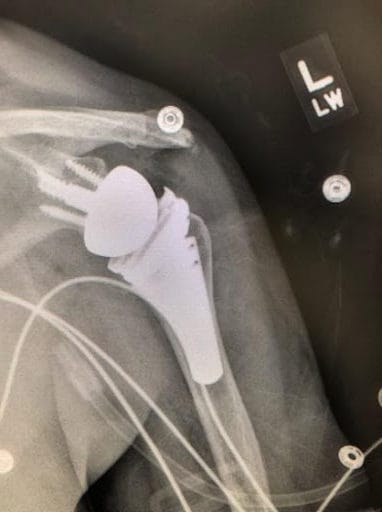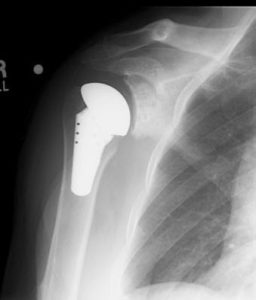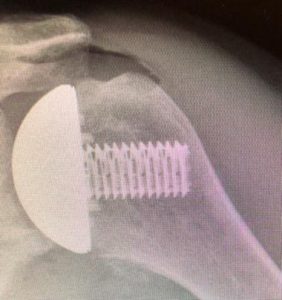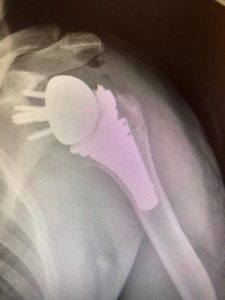Shoulder Replacement Surgery in Chillicothe, OH
Total shoulder replacement or total shoulder arthroplasty is a complex procedure that involves replacing the shoulder joint with artificial implants, made of metal and plastic. The goal of total shoulder replacement surgery is to reduce pain, improve motion and restore function.
Shoulder replacement may be recommended for many different reasons. Some of the indications for a shoulder replacement include shoulder arthritis, an irreparable rotator cuff tear, shoulder fractures. There are other reasons a patient may have a shoulder replacement, but they are less common.

When is Shoulder Replacement Recommended?
Some patients may choose to first try to manage their condition with more conservative, nonsurgical treatment options. These options can include activity modifications, nonsteroidal anti-inflammatory drugs, corticosteroid injections and/or physical therapy.
Total shoulder replacement is recommended when conservative management fails and a patient’s activities of daily living are significantly impacted. This can be the result of severe pain and loss of function. The goal when having a shoulder replacement is to improve your quality of life.
People who benefit from shoulder replacement surgery often have:
- Severe shoulder pain that interferes with everyday activities
- Pain that may be severe enough to prevent a good night’s sleep
- Loss of motion or weakness in the shoulder that significantly impacts function
- Failure to significantly improve through alternative treatment options
Common conditions requiring total shoulder replacement include:
- Osteoarthritis, or degenerative joint disease
- Rheumatoid arthritis, where the synovial membrane surrounding the joint becomes inflamed and thickened, and leads to a destruction of the shoulder joint
- Avascular necrosis, or the disruption of blood supply to the ball of the shoulder
- Irreparable rotator cuff tear
- Severe shoulder injuries, such as a broken bone
- Failed previous shoulder replacement surgery
Over 50,000 shoulder replacements are done in the United States each year.
Why Choose Dr. Cohen?
OVER 20 YEARS EXPERIENCE
One of the first orthopedic surgeons employed by a large hospital. Dr. Cohen spent 20 years.
TRUSTED BY OVER 100,000+ PATIENTS WORLDWIDE
Over his distinguished career, Dr. Cohen has cultivated a reputation of excellence and trust among his patients and his peers.
UTILIZING THE LATEST TECHNOLOGY
To achieve the best surgical outcomes, Dr. Cohen utilizes the most advanced technologies and techniques, keeping his practice state of the art.
PATIENT SAFETY IS TOP PRIORITY
An individualized, patient-focused process coupled with decades of training and experience help ensure maximum safety for all of Dr. Cohen’s patients.
Types of Shoulder Replacement Surgery
There are three types of shoulder replacement surgery: traditional (anatomic) total shoulder replacement, partial shoulder replacement and reverse total shoulder replacement.
Total/ Partial Shoulder Replacement
In an anatomic total shoulder replacement, the interval between the deltoid and pectoral muscles is developed to create a path to the shoulder joint. The subscapularis rotator cuff tendon is transected to gain access to the shoulder joint. Dr. Cohen will then remove arthritic sections of the joint; insert an artificial socket, ball, and stem; close and stitch the muscle; and clean and stitch the incision.

Partial Shoulder Replacement
In a partial shoulder replacement only the ball or humeral head will be replaced.

Reverse Shoulder Replacement
In a reverse shoulder replacement, the positions of the ball and socket are reversed. An artificial ball is placed where the patient’s socket was and a socket implant is placed on the humeral head side. The reverse placement offers additional stability. A reverse shoulder replacement surgery is commonly done for irreparable rotator cuff tears, shoulder arthritis associated with a rotator cuff tear, and complex shoulder fractures.

Potential Complications of Shoulder Replacement
Even very safe procedures have potential for risks and complications. Possible complications following total shoulder replacement include infection, nerve injury, and problems with the implants that may require revision surgery. Dr. Cohen will review the risks and benefits of shoulder replacement surgery specific to you and any existing medical co-morbidities that you have that could impact your recovery.
Shoulder Replacement Results
Shoulder replacement surgery is a very effective way to eliminate or significantly reduce shoulder pain and improve shoulder range of motion and function. The amount that range of motion increases will depend on factors such as how long the range of motion has been limited and whether the rotator cuff tendons were still intact and functional, as well as the patient’s active participation in the post-replacement rehabilitation program. Most patients are highly satisfied with the results of their total shoulder replacement.

Shoulder Replacement FAQs
Am I Too Old for Shoulder Replacement?
 There is no age limit to shoulder replacement — the shoulder problem and failure of other treatments drive the decision for shoulder replacement surgery. However, older adults may need approval from their primary care physician and require additional tests to ensure the procedure is the best path forward.
There is no age limit to shoulder replacement — the shoulder problem and failure of other treatments drive the decision for shoulder replacement surgery. However, older adults may need approval from their primary care physician and require additional tests to ensure the procedure is the best path forward.
The average patient for total shoulder arthroplasty is middle-aged or older, but young men and women may also need shoulder replacement if they work physically demanding jobs such as construction. A severe accident or fall that causes traumatic injury, contact sports injuries and certain medical conditions such as rheumatoid arthritis can damage the shoulder and require shoulder replacement to alleviate symptoms.
Who Will Perform the Surgery?
Dr. Cohen will complete your shoulder replacement using the latest techniques with advanced technologies such as the Univers™Apex total shoulder system. He has performed tens of thousands of orthopedic procedures and mentored more than 100 other orthopedic surgeons on enhanced surgical techniques. Dr. Cohen is board-certified in orthopedic surgery and believes in providing the safest healthcare environment for patients to reduce complications and optimize their results.
Do I Need to be Under General Anesthesia for Shoulder Replacement?
Shoulder replacement surgery often requires general anesthesia, which means a skilled and experienced anesthesiologist will administer anesthesia, so you’re asleep. You’ll wake up to a new shoulder with less pain and a better quality of life. Sometimes, a regional anesthetic is an option for patients, so you’re awake but don’t feel anything in the surgical area.
How Long is Shoulder Replacement Surgery?
Shoulder replacement typically takes around one hour, and you’ll spend a few hours in the recovery room for the anesthesia to wear off. The plan will be for discharge home the same day of surgery.
What Do I Need to Know About Recovering from Total Shoulder Arthroplasty?
 You may need pain medications for the first few days, but you should start to feel good with less pain and more mobility soon. Your physical therapy may start in the recovery room and you’ll be sent home with an exercise program to help strengthen your new shoulder.
You may need pain medications for the first few days, but you should start to feel good with less pain and more mobility soon. Your physical therapy may start in the recovery room and you’ll be sent home with an exercise program to help strengthen your new shoulder.
A sling will protect and support your shoulder , and the duration of use will depend on the procedure performed. It’s critical that you don’t lift anything or do forceful arm movements to avoid stress on the shoulder joint. That includes avoiding using your arm to push yourself up from a seated or lying position. Overusing your shoulder during recovery may limit joint mobility. You may use the arm to lift a glass of water, but nothing heavier for two to four weeks or until you’re cleared to do so.
Recovery from total shoulder arthroplasty takes about 6 to 12 weeks, and you’ll restart your normal activities slowly. Wait to resume driving and returning to a physically demanding job until you’ve spoken with Dr. Cohen about when it’s safe to perform these tasks.
Will My Range of Motion be Restored After Surgery?
Most patients are happy with their shoulder replacement results with restored motion and less pain (or no pain at all). Whether you regain full mobility depends on your anatomy and the circumstances of your injury and procedure, as well as your compliance with the recommended physical therapy program.
Schedule Your Consultation Today
If you are experiencing chronic shoulder pain and restricted movement, you may be a candidate for total replacement surgery. To learn more, schedule a personal consultation with Dr. Brian Cohen, who has treated over 100,000 patients worldwide and has performed over 3,000 total shoulder replacements. Call or email his office today.






